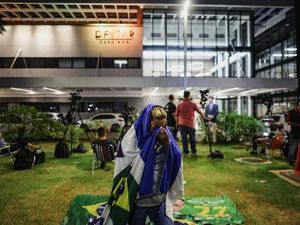ZIMBABWE'S Parliament found itself suddenly enveloped by darkness during what was meant to be one of the key events of the government calendar—the presentation of the 2025 National Budget. It was Finance Minister Mthuli Ncube who faced the startling interruption as he was concluding his speech when the power cut hit, causing chaos and sparking outrage among parliamentarians.
The unexpected blackout left distinguished officials, including President Emmerson Mnangagwa and Vice-President Constantino Chiwenga, literally sitting in the dark, which some opposition members cheekily remarked was emblematic of the grim state of affairs facing the country.
This outage is not merely incidental; it serves as yet another symptom of Zimbabwe's prolonged energy crisis. Zimbabweans have been grappling with daily power cuts lasting up to 12 hours, driven primarily by severe drought conditions affecting electricity generation at the Kariba Dam, the nation's main power supply.
Just before the lights flickered out, Ncube had projected troubling figures for the agricultural sector, expecting it to contract by 15% this year. Nonetheless, he expressed optimism about economic growth, anticipating a 6% increase for the next fiscal year should rainfall patterns improve.
George Manyaya, who serves as the spokesperson for the Zimbabwe Electricity Supply Authority (ZESA), informed local media outlet ZimLive, emphasizing this blackout was unexpected and not part of any planned power cuts, asserting there was adequate electricity supply designated for parliament. According to ZESA, the outage was linked to lightning strikes from storms earlier, which disrupted the electricity flow.
While some may view the blackout as merely unfortunate timing, it has amplified discussions surrounding the country’s energy policies and needs. Leslie Mhangwa, an MP with the opposition Citizens Coalition for Change (CCC) party, criticized the government’s delay on energy issues, proposing the focus should shift toward allowing private sectors more freedom to operate efficiently within the energy market. Mhangwa lamented, "The only thing that's happening seems to be the deferment of value-added tax, but the real issue remains unaddressed – energy must be sold in US dollars for industries, which is much cheaper and more sustainable."
The overwhelming consensus in parliament indicated the pervasive frustration with the government’s handling of the energy crisis. Mhangwa went on to predict even longer power shortages looming, marking yet another nail in the coffin for the already embattled government’s energy policies.
Further adding to the criticism, Edwin Mushoriwa, also from the CCC and representing Dzivarasekwa, vehemently dismissed Ncube’s budget allocation of ZWL259 million to the energy sector as grossly inadequate, particularly when considering the depth of the current energy crisis gripping citizens across the nation.
"The minister has failed to propose any meaningful incentives or solutions to alleviate power shortages," Mushoriwa asserted. "We anticipated suspension of duties on solar energy products to ease this burden for the population. There's nothing to commend here. It's just more promises without substance. The situation is dire, and we're merely skimming the surface with some budget allocations."
The scale of power outages has reached alarming levels, particularly with many regions experiencing blackouts exceeding 15 hours daily. The reasons cited for these continued failures include significant breakdowns at Hwange power plants and critically low water levels at Kariba Dam, which has all but forced many Zimbabweans to adjust to life without reliable electricity.
To put this incident within the broader narrative of Zimbabwe’s enduring issues, it's important to recognize this is just one among many examples of the systemic challenges plaguing the nation, particularly since the onset of extreme weather patterns exacerbated by climate change. This has encapsulated how far Zimbabwe must travel to reach stable governance and effective public service delivery.
Returning to the immediate aftermath of the Parliament’s abrupt plunge back to darkness, the scene was one rife with not just discomfort but political symbolism. For members of the opposition, the blackout served as more than just literal darkness—it represented the failing state of governance and the increasing inability of the ruling authorities to address substantive issues facing everyday Zimbabweans.
Historically, such symbolic moments can catalyze public sentiment and political mobilization, and with Zimbabwe's electorate still wary of the ruling Zanu-PF party's perceived failures, it remains to be seen how this incident will resonate with the voting populace.
While some fleeting moments of humor surfaced on social media, as light-hearted commentators likened the parliamentary blackout to yet another tragicomic display of the country’s political dilemma, the underlying realities include disrupted civil functions, business interruptions, and deepening public frustration.
"Our communities struggle under these blackouts daily, businesses are halted, and lives are disrupted, it’s heartbreaking," lamented one Harare resident post the parliamentary incident. The government may soon face mounting pressure to resolve these consistent failures and implement stronger measures for sustainable energy solutions. Until then, Zimbabweans continue to navigate their lives shrouded by uncertainties, literally and metaphorically living through the darkness.
The return of Mnangagwa and his cabinet to parliament may also serve as rebuke or reminder of the pressing issues they need to attend to urgently. While two sides of the political spectrum dissect blame and with responsibility seemingly deferred, many Zimbabweans are simply left waiting for the lights to come back on, figuratively hoping for governance to shed some light on their path forward.



